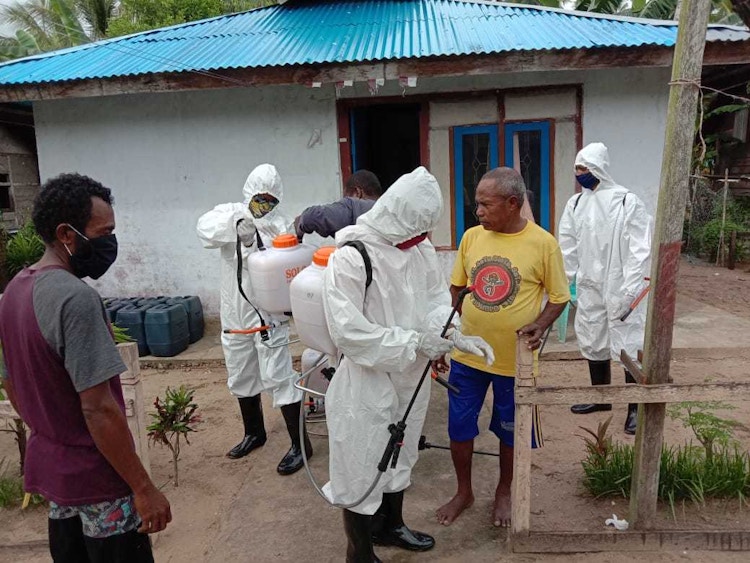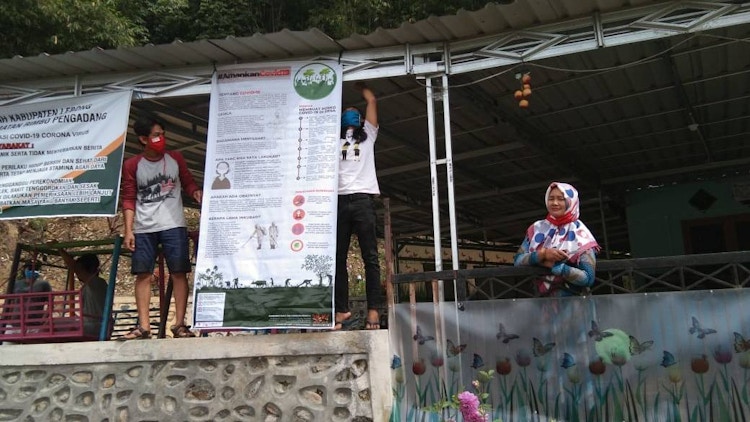Indigenous peoples spearhead innovative approaches to counter COVID-19.
Indigenous peoples spearhead innovative approaches to counter COVID-19.
Indigenous traditions and customs present strengths and weaknesses in the fight against the coronavirus. The pandemic has led the Indonesian Indigenous movement AMAN to develop innovative methods to fight it. Their integrated approach may well be a model for others.

An indigenous boy from the Orang Rimba of Sumatra in Indonesia. Photo: Per Ivar Nikolaisen/Rainforest Foundation Norway
- Some Indigenous traditions may make us better prepared to tackle the spread of the coronavirus. Still, our communal culture may also make us extra vulnerable, says indigenous veteran Abdon Nababan.
In several rainforest countries, Indigenous peoples have taken measures of their own to tackle the ongoing spread of the coronavirus. As the coronavirus is spreading in Indonesia, the country’s Indigenous groups are taking bold and innovative steps to avoid the devastation of their communities. One of the most comprehensive and systematic approaches has been that of the Indonesian Indigenous Peoples Alliance of the Archipelago (AMAN).
AMAN, organizing some 2400 Indigenous communities across the vast archipelago, has taken measures to limit the spread of the pandemic. In addition to lockdowns, AMAN launched a new cell phone app to gather data across the vast archipelago. Cases of contagion are registered and reported. Surplus granaries have been identified and are being shared with less fortunate neighboring communities. Available medicines and medical personnel are being mapped out.
Technological innovations to fight the pandemic
On March 19, the General Secretary of AMAN, Ms. Rukka Sombolinggi, instructed AMAN staff to work from home. Indigenous communities were advised to lock down their villages, conduct regular health checks, and to ensure a sufficient supply of drinking water, food, and medicines in their villages.
A special unit in AMAN launched a dedicated cell phone app as a technological aid in its rapid data collection and strategy development.
Through the app and a web service, the AMAN unit can track a wide range of data relevant for handling the COVID-19 pandemic in Indigenous areas:
- Cases of COVID-19 to be reported to the governmental COVID task force and local health unit
- Food availability
- Lockdown conditions
- Availability of medicine and physicians
- Future harvest readiness
- Health conditions and availability of AMAN staff in the field
The GPS- guided app and related web-based service, named Amankancovid, is also available through a webpage so that individuals who don’t have cell phones can get access. Communities that have no internet access at all are reached by landline or through other means. That way, Indigenous communities that entirely lack cell phone coverage can collect information that can be uploaded to the website when the opportunity comes. been identified and are being shared with less fortunate neighboring communities. Available medicines and medical personnel are being mapped out.

The AMAN COVID-19 team in Aru district of Maluku, spraying disinfectant in the community village Rebi, South Aru sub-district. Photo: AMAN
Encourages lockdowns and quarantine
At the beginning of May, AMAN reported a growing number of cases of indigenous individuals who have contracted COVID-19. So far, the affected seem mostly to be Indigenous persons working in the cities, who can stay and get treatment there. AMAN reports cases in far-flung locations in the provinces of South Sulawesi, South Kalimantan, East Nusa Tenggara, West Sumatra, Maluku, South East Sulawesi, and Lampung.
AMAN board member and veteran Abdon Nababan emphasizes the importance of lockdowns of Indigenous territories:
“Luckily, Indigenous territories have, generally speaking, sufficient food sources, and traditional medicines of various kinds are available to enhance the immunity of Indigenous peoples as an antidote. On the other hand, the communal culture of Indigenous peoples makes them extra vulnerable to the spread of the coronavirus, and they may, in fact, face extinction. This is especially the case for Indigenous communities with small populations.”
Lockdowns have been enforced in several communities around the country, including in Kalimantan, West Papua, and South Sulawesi. Members of the Indigenous communities that have returned to their villages since the pandemic started were told to self-quarantine. Some Indigenous communities such as Ulusalu in Tana Toraja, South Sulawesi have set up custom-made quarantine shelters for returnees.
Self- sufficiency through community bartering
Information collected by AMAN through their app since March indicates that food security for most Indigenous communities is ensured for the coming 2-3 months, as these months are the harvest season.
At the same time, Indigenous territories controlled by oil palm and mining, as well as agricultural areas dominated by hard crops such as rubber, will be adversely affected because the inhabitants must buy food and essential commodities from outside of their area. Initiatives focused on bartering food launched so that Indigenous territories with a food surplus can help neighboring communities. There are fears, however, that as the pandemic continues, the risk will grow that food insecurity will grow in several areas.

The AMAN emergency response team in Rejang Lebong, Bengkulu setting up a center for information and support. Photo: AMAN
Corporate operations increase the threat to Indigenous communities
AMAN supports community health centers (PUSKESMAS) by providing health care equipment needed to provide initial treatment of COVID-19 cases before transfers to hospitals.
AMAN Secretary-General, Rukka Sombolinggi, appeals to the Indonesian government for enhanced support and attention in these particularly trying times:
“We appeal to the government to stop the operations of companies operating in and around Indigenous areas. Many such operations, particularly oil palm and mining, are a real and present danger to Indigenous communities’ security and livelihoods. These operations have been a threat to us since their inception. Still, the current corona crisis has dramatically exacerbated the threat.
Indigenous communities who have already lost their lands to rapid changes in land use driven by large scale investment may in the future need assistance from the wider public for their food security if the situation worsens.”
- AMAN´s recommendation to Indigenous communities:
- Granaries with food surplus are identified and mapped out
- Accelerated planting of food crops
- Textile masks are produced by special “business groups” in the communities
- Development of natural disinfectants and support facilities in the villages
- Independent quarantine per village or family.
- Medical care supplies provided to community health centers and nurses in Indigenous areas.
THIS IS AMAN
Indonesia is home to an estimated number of 50-70 million Indigenous peoples.
AMAN stands for Aliansi Masyarakat Adat Nusantara, the Indigenous Peoples’ Alliance of the Archipelago. AMAN is a representative organization that represents 15 million individuals from 2,230 Indigenous communities across Indonesia.
AMAN’s states that its mission is to “empower, advocate for, and mobilize Indigenous peoples of the Indonesian archipelago to protect our collective rights, and to preserve our cultures and environments for current and future generations.”
RFN currently works closely with Perempuan AMAN, the Women’s Wing of AMAN.